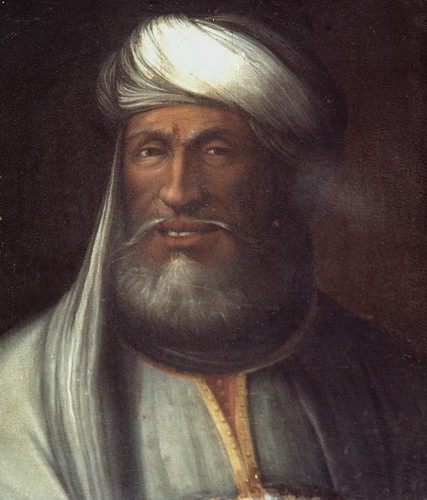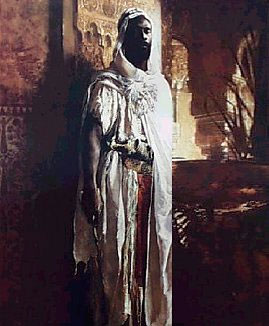When Black Men Ruled Europe: The Moors Of Spain - Culture - Nairaland
Nairaland Forum / Nairaland / General / Culture / When Black Men Ruled Europe: The Moors Of Spain (74372 Views)
Photos Of Nigerian Masquerade Spotted In Spain / Sad! See This Instagram Page Insulting Black Men / Igbos In Spain Attend Their Village Meeting In Native Attires (Photo) (2) (3) (4)
(1) (2) (3) (4) (5) (6) (7) (8) (9) (10) ... (11) (Reply) (Go Down)
| When Black Men Ruled Europe: The Moors Of Spain by bigfrancis21: 10:15am On Mar 07, 2015 |
After the fall of the Roman empire in the 4th to 5th centuries, Europe entered into what is known historically as the Dark ages - a period characterized by lack of growth in knowledge, backwardness and little development. Civilization was to be brought to Europe again through the Moors of North Africa who were a black muslim people, in their conquest to spread Islam. From 711 to 1490, black men ruled in Spain, Portugal and France, leaving behind architectural wonders of today: The Alhambra and the Mosque of Cordoba in Spain.
http://www.blackhistorystudies.com/resources/resources/15-facts-on-the-moors-in-spain/ 7 Likes 2 Shares |
| Re: When Black Men Ruled Europe: The Moors Of Spain by bigfrancis21: 10:15am On Mar 07, 2015 |
Discovered Paintings about the Moorish People of Early Spain:   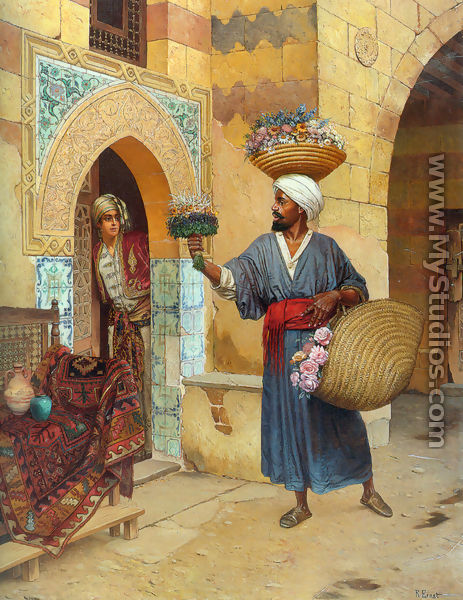  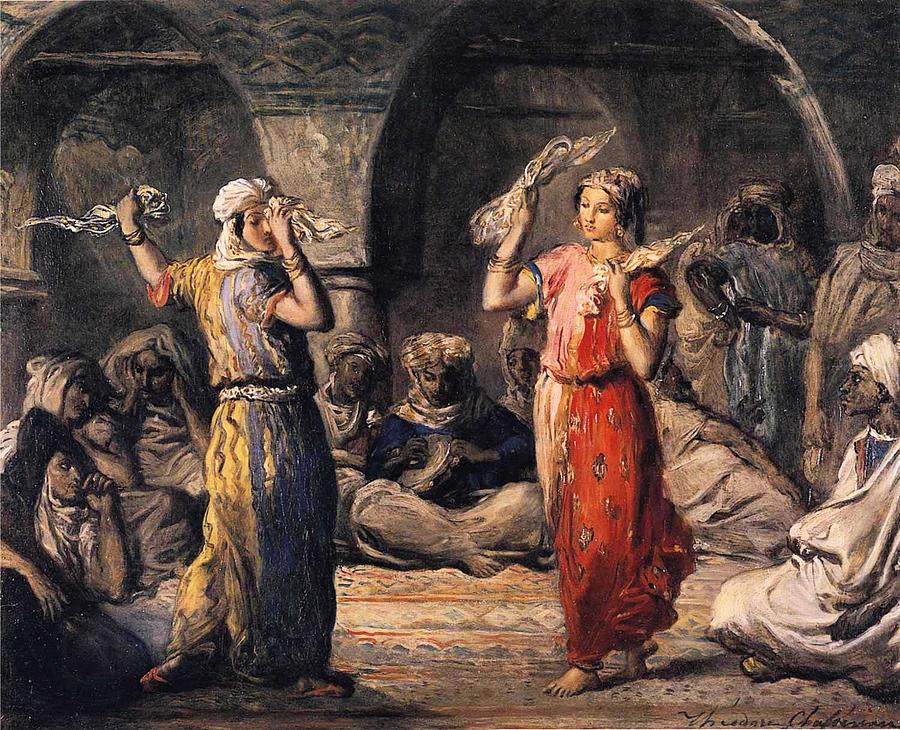 There has been an ongoing attempt to rid spain, portugal and parts of france of their ancient black african civilization. The moors are said to have laid the template for the furtherance of science, mathematics and arts in the world today. The very fact that these people were a black people is the reason this part of history has continued to be ignored. Black Man, awaken to your history! 21 Likes 4 Shares |
| Re: When Black Men Ruled Europe: The Moors Of Spain by bigfrancis21: 10:22am On Mar 07, 2015 |
In ancient times, 'moor' was used by historians and authors to refer to black people. 'Negro', 'black', etc are recent names for people of colour. The "Moors" of Europe Etymology Variants of the term "Moor" have been used by many Europeans since ancient times as a general description for indigenous Africans. Contrary to popular belief, the term is not synonymous with "Islamic" or any specific Arab or African religion, civilization, or ethnicity. 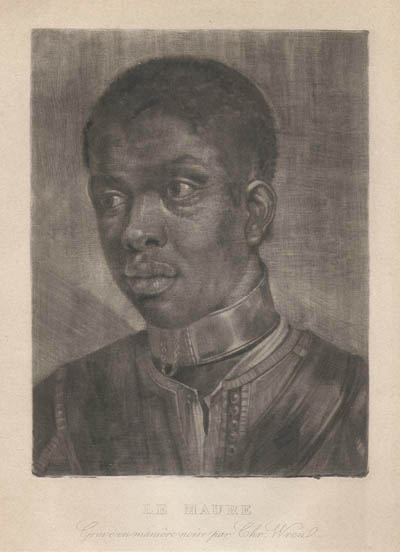 The artist, Christopher Wren (1632-1723), specifically entitled this painting, "Le Maure", French for "The Moor" The origin of the English term, "Moor," is the Greek word, "μαυρο" or "mavro" which literally means "black, blackened or charred" and has long been used to describe black or very dark things such as, "Mavri Thalassa" which refers to the Black Sea or "mavri spilia" which means "black cave." Ancient Greeks used the term to describe the complexion of Africans and (even today, some Greeks use "mavro" to refer to Africans, although in a pejorative manner). One need not be a linguist to see the word's evolution from the Greek "mavro" to the Latin word, "mavrvs" (actually, "mavro" in the ablative, singular, masculine Latin form). The English transliteration is "Maurus" and the plural form is "Mauri," specifically used by ancient Romans in reference to Black Africans. Writers in both Greek and Latin specifically used the term as a racial identity. In the Epitome de Caesaribus (390s AD), we learn that Aemilianus was "a Moor by race." Procopius of Caesarea (500-565 AD), a Byzantine scholar who wrote in Greek, said in his History of the Wars, "beyond that there are men not black-skinned like the Moors..." Even through the middle ages, the term (as well as the Spanish, "moro," the German "mohr," the Dutch "moor" etc.) continued to be used in reference to Black Africans. In one of the oldest Dutch texts (1300s AD), a Moor was described specifically as "black." Even through the middle ages, the term (as well as the Spanish, "moro," the German "mohr," the Dutch "moor" etc.) continued to be used in reference to Black Africans. In one of the oldest Dutch texts (1300s AD), a Moor was described specifically as "black." Somehow by the 20th century, "Maurus" and "Moor" suddenly transformed into Berber and Arab -- a grave contrast to historical precedent. An image entitled, "Habit of a Moor of Arabia," from Thomas Jefferys' A Collection of the Dresses of Different Nations (1757-1772). Further proof of the true definition of the Latin term "Maurus" can be found in early English-Latin dictionaries: - "Maurus" was synonymous with "Moor," "negro," and "Aethiops" in John Etick's A new English-Latin dictionary (1783) - In A new Latin-English dictionary by William Young (1810), "Maurus" is a "black Moor" - According to the Ainsworth's Latin Dictionary, Morell's abridgment by Alexander Jamieson, Robert Ainsworth (1828), "Maurus" means "black Moor" The English term "Moor" also meant "Black" in English dictionaries and encyclopaediae prior to the 20th century: - "Moor" meant "negro" or "black-a-moor" in A Dictionary of the English Language (1768) by Samuel Johnson - The Encyclopaedia Londinensis (1817) by John Wilkes lists "moor" as follows: "[maurus, Lat. μαυρο, Gr., black.] a negro; a blackamoor." 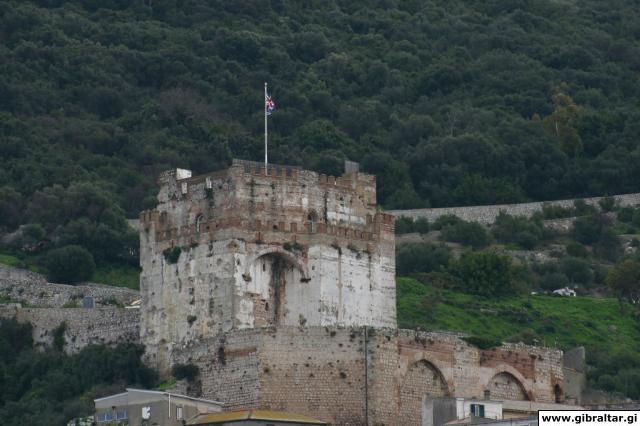 "Moorish" Castle overlooking Gibraltar (700s AD) 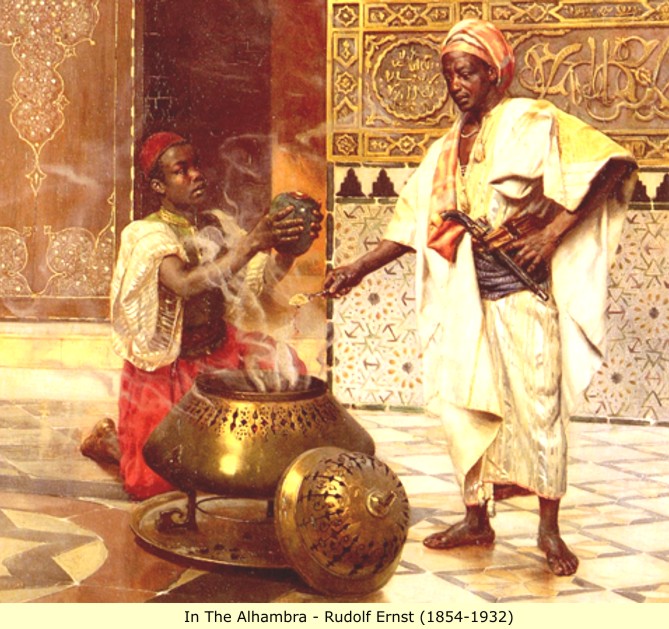 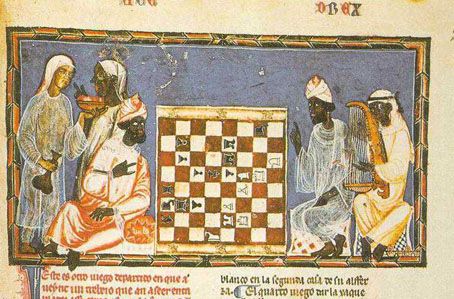 A depiction of Moorish noblemen playing the board game commonly known as chess and one playing a harp in Alfonso X's Libro de los Juegos ("Book of Games", 1283 AD)    3 Likes 1 Share |
| Re: When Black Men Ruled Europe: The Moors Of Spain by bigfrancis21: 10:23am On Mar 07, 2015 |
By 800 AD, the Franks began efforts to contain the spread of Moorish society to the south of the Pyrennees mountains. Much of the literature, lore and art that followed centered around the Franks' efforts to defeat the Moors. For instance, the Song of Roland (French, La Chanson de Roland, 1140-1170 AD), the oldest known French literary work, describes Frankish Charlemagne's (742-814 AD) long campaign in southern France. The text's account of a Moorish leader named Marsile, is as follows: "Although Marsile has fled, his uncle Marganice remains, he who rules Carthage, Alfrere, Garmalie, and Ethiopia, an accursed land. He has the black people under his command, their noses are big and their ears broad, together they number more than fifty thousand. They ride fiercely and furiously, then they shout the pagan battle cry." Then another African general whom the Franks called Abisme is described as follows: "In the forefront rides a Saracen, Abisme...He is as black as molten pitch."  "Wild Men and Moors," a tapestry (1350-1400 AD) depicting the ruling Moorish Strasbourgois of France/Germany (Boston Museum of Fine Arts) There were also several accounts of Moors in northern and central Europe, including that of the so-called "Freising Moor." The oldest known use of his image on any coat of arms was created around 1300 AD by Bishop Emicho of Wittelsbach in Skofja Loka, Slovenia. The town of Freising, Germany's oldest known coat of arms dates to 1362, which included the head of the Moor along with the bear he supposedly defeated while traveling with Bishop Abraham of Freising. The legend says that Freising's Moor was a servant, however, the crown atop his head may refute said legend. The archdiocese of Munich, Pope Benedict XVI, and several Bavarian municipalities continue to use depictions of the "Freising Moor" on their official coats of arms, a testament to the presence and authority of Africans in medieval Europe. Later, "Maurus" (in the form of Maurice, Moritz and Morien, etc.) became synonymous with not only the aforementioned, but numerous blacks of high regard. Sir Morien, for example, was a knight thoroughly described in the romance novel, Lancelot-Compilatie (the Hague Lancelot Compilation), the Dutch version of Lancelot (1300s AD) as "all black....his head, his body, and his hands were all black, saving only his teeth." Morien is the son of Sir Agloval and a Moorish princess whom Agloval met in Africa during his quest to find the holy grail. Sir Morien is also described as a "bold knight" who experiences racism while seeking transportation overseas to reunite with his father, saying "None will take me over the water since I am a Moor."  A Moor in Spain, portrayed in a Cantiga (1200s AD) In the 1490s AD, Catholic rulers had begun to rid the Iberian Peninsula of much of its large Islamic Moorish population (as well as other people who practiced non-Christian religions such as Judaism). After waging a long war on Granada, Spain's Ferdinand V and Isabella I seized control of that region in 1492, promising to keep religious freedom. However, Cardinal Francisco Jimenez Cisneros began a large-scale Inquisition in 1499, including mass coversions to Christianity, persecutions, book burnings, and closings mosques and synagogues, and by 1502 Ferdinand and Isabella expelled all non-Christians, which included many Moors. Portugal's King Manuel also expelled non-Christians, many of whom were Moors, by royal decree in 1496. The result was that some relocated to other parts of Europe where they became high ranking nobility as their knowledge and skill continued to be highly valued. Although most Moorish families of nobility (the origin of the term "Black Nobility".) intermarried with Europeans, their surnames continued to link to their heritage. Family names such as Moore, Morris, Morrison, Morse, Black, Schwarz (the German word for "black".), Morandi, Morese, Negri, etc. all bear linguistic reference to their African ancestry. For example, the oldest Schwarz family crests even depict the image of an African, or "Schwarzkopf," ("black head" in German). Other families and municipalities adopted similar coats of arms which continue to exist in some form, demonstrating the important role Africans played in European history. http://www.taneter.org/moors.html 4 Likes 2 Shares |
| Re: When Black Men Ruled Europe: The Moors Of Spain by bigfrancis21: 10:47am On Mar 07, 2015 |
The Great Mosque of Cordoba in its beauty and splendour, one of the two ancient buildings and civilizations left behind by the Moors of Spain:   The Alhambra, a Moorish structure of mathematical complexity, magnificence and marvelous beauty built by the mighty black rulers of spain, is a great tourist destination site today with about 8,000 visitors everyday:    6 Likes 2 Shares |
| Re: When Black Men Ruled Europe: The Moors Of Spain by ugosonic1: 12:44pm On Mar 07, 2015 |
ok |
| Re: When Black Men Ruled Europe: The Moors Of Spain by angrybird007: 12:45pm On Mar 07, 2015 |
#Teamblack 3 Likes |
| Re: When Black Men Ruled Europe: The Moors Of Spain by absoluteSuccess: 12:45pm On Mar 07, 2015 |
Is it the blacks of Africa who do not have anything to do with north Africa talkless of Europe, (according to some folks here) that we are talking about, or we are adapting ourselves to the historical achievements of moors of north Africa based on pigmentation similarity? 2 Likes |
| Re: When Black Men Ruled Europe: The Moors Of Spain by ichidodo: 12:46pm On Mar 07, 2015 |
General Hannibal was a blackman... 2 Likes |
| Re: When Black Men Ruled Europe: The Moors Of Spain by anonimi: 12:46pm On Mar 07, 2015 |
Since when did Moors of North African become Negroes of sub-Saharan Africa  How many people are aware of how Blacks are racially discriminated against in Libya, Morocco, Algeria, Egypt etc? 1 Like |
| Re: When Black Men Ruled Europe: The Moors Of Spain by makazona(m): 12:46pm On Mar 07, 2015 |
Our Nairaland is gradually coming back to be educative AGAIN kudos to d op and mods who brought this out. 14 Likes |
| Re: When Black Men Ruled Europe: The Moors Of Spain by 1stola: 12:47pm On Mar 07, 2015 |
Touchy... |
| Re: When Black Men Ruled Europe: The Moors Of Spain by ichommy(m): 12:47pm On Mar 07, 2015 |
#TeamBlack #Dudu #Blackisbeautifu Awesome. Weldone OP. 1 Like |
| Re: When Black Men Ruled Europe: The Moors Of Spain by kozykid(m): 12:47pm On Mar 07, 2015 |
Thank You Original Poster for helping us Revisit our History and educating Youths who believe The Europeans discover and civilized Africa, Thanks for teaching us Our own history in our own Way, May The Good lord enrich Your Knowledge in all Capacity. 9 Likes |
| Re: When Black Men Ruled Europe: The Moors Of Spain by GlorifiedTunde(m): 12:47pm On Mar 07, 2015 |
Chai! I wish I can read this thing oo  |
| Re: When Black Men Ruled Europe: The Moors Of Spain by Barabbas(m): 12:47pm On Mar 07, 2015 |
ALHAMBRA sounds like ANAMBRA  One thing is, they are both successful people! 5 Likes |
| Re: When Black Men Ruled Europe: The Moors Of Spain by anonym0us: 12:48pm On Mar 07, 2015 |
20 |
| Re: When Black Men Ruled Europe: The Moors Of Spain by Situation001(m): 12:48pm On Mar 07, 2015 |
Remember civilization started in Africa.. A time shall come that Africa will once more rule the world... 4 Likes |
| Re: When Black Men Ruled Europe: The Moors Of Spain by fio(m): 12:48pm On Mar 07, 2015 |
Nice one |
| Re: When Black Men Ruled Europe: The Moors Of Spain by alienvirus: 12:48pm On Mar 07, 2015 |
Keep it coming. Many thanks to Islam for showing the world the light of civilization. Quote me negatively at ur own phoolishness. Noff said. 7 Likes |
| Re: When Black Men Ruled Europe: The Moors Of Spain by Loyalblak007(f): 12:49pm On Mar 07, 2015 |
 |
| Re: When Black Men Ruled Europe: The Moors Of Spain by hucienda: 12:49pm On Mar 07, 2015 |
I need someone like bigfrancis21 in my ranch... will navigate me through the seeds to the fruits they will eventually bear. #history Cordoba... Ivan Cordoba be balling here in retirement 1 Like |
| Re: When Black Men Ruled Europe: The Moors Of Spain by bastien: 12:50pm On Mar 07, 2015 |
Even Jesus na black man  |
| Re: When Black Men Ruled Europe: The Moors Of Spain by Nobody: 12:50pm On Mar 07, 2015 |
Sorry, too long. Cant read today. Maybe next weekend |
| Re: When Black Men Ruled Europe: The Moors Of Spain by Nobody: 12:50pm On Mar 07, 2015 |
Shey no be say dey use nairaland swear for me  ,I waited 8min for a train,I was carried away on Nairaland by the time I raised my head up,train already leaving station.I have to wait another 10min ,I waited 8min for a train,I was carried away on Nairaland by the time I raised my head up,train already leaving station.I have to wait another 10min  * trow phone on rail track* * trow phone on rail track*1 Like |
| Re: When Black Men Ruled Europe: The Moors Of Spain by Nobody: 12:51pm On Mar 07, 2015 |
If the truth is told then the youth can grow. Learn to survive until they gain control. Read more, learn more, change the globe. 3 Likes |
| Re: When Black Men Ruled Europe: The Moors Of Spain by xage(m): 12:51pm On Mar 07, 2015 |
Islam is the begining of civilization 8 Likes 1 Share |
(1) (2) (3) (4) (5) (6) (7) (8) (9) (10) ... (11) (Reply)
List Of 371 Ethnic Groups In Nigeria / Pictures Of Ethiopian Women Who Beg To Be Whipped / Facts About The Yoruba Enclave In The Heart Of Aniocha In Delta State
(Go Up)
| Sections: politics (1) business autos (1) jobs (1) career education (1) romance computers phones travel sports fashion health religion celebs tv-movies music-radio literature webmasters programming techmarket Links: (1) (2) (3) (4) (5) (6) (7) (8) (9) (10) Nairaland - Copyright © 2005 - 2025 Oluwaseun Osewa. All rights reserved. See How To Advertise. 69 |
